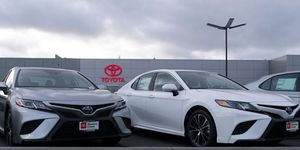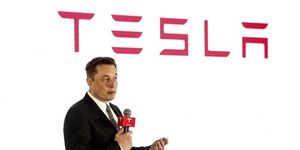- Tesla reported its third straight quarterly profit this past week, with $354 million coming from selling regulatory credits.
- Automakers who need to comply with emissions regulations buy the credits from Tesla, which accumulates credits from having an all-electric lineup.
- It is unclear where all of the credits go, but last summer, it was revealed that GM and FCA had agreed to buy credits from Tesla.
Amid a difficult economic environment, Tesla eked out a profit last quarter, the company’s third successive quarter in the green. The revenue stream that helped the electric vehicle maker get there: regulatory credits. Tesla earned $354 million from these credits this past quarter, a record for the company and a 64 percent increase as compared to the year prior, according to Tesla’s earnings report.
Through having an all-electric lineup, Tesla amasses regulatory credits from various sources around the world. The credits are given out to automakers based on the vehicles they sell; in some areas, credits are given out based on the number of electric vehicles an automaker sells, and in others, it is based on the emissions that come from the vehicles sold.
The Zero Emissions Vehicle (ZEV) program is one such source; the program is a California regulation which mandates that automakers must sell a certain number of electric vehicles relative to their total sales. There are ten other states in the U.S. that have adopted the measure. If an automaker ends the year without sufficient credits, they’re fined – that is unless they buy them from a company such as Tesla.
The federal government’s system for regulatory credits will change beginning for the 2021 model year as the Safer Affordable Fuel-Efficient (SAFE) emissions regulations come into place. Nonetheless, up until the new regulations come into play, automakers have received emissions credits from both the National Highway Traffic Safety Administration (NHTSA)—the Corporate Average Fuel Economy (CAFE) standards—and the Environmental Protection Agency (EPA)—the Greenhouse Gas Emissions (GHG) standards—depending on the fuel efficiency of vehicles.
Similar measures have been put in place in the European Union, where rules mandate average emissions from new vehicles. In order to avoid what could have amounted to over $2.1 billion in fines according to analysts, Fiat Chrysler paid Tesla hundreds of millions of dollars so their vehicles are counted in the same fleet and therefore FCA’s emissions are averaged with those of Tesla.
For years, Tesla has been paid by other automakers for the regulatory credits that they acquire as a result of their all-electric lineup and it was a mystery as to who exactly was purchasing the credits. Last summer, Bloomberg reported that General Motors and FCA had disclosed in a Delaware court that they had agreed to buy greenhouse gas emissions credits from Tesla.
Source: Motor - aranddriver.com






